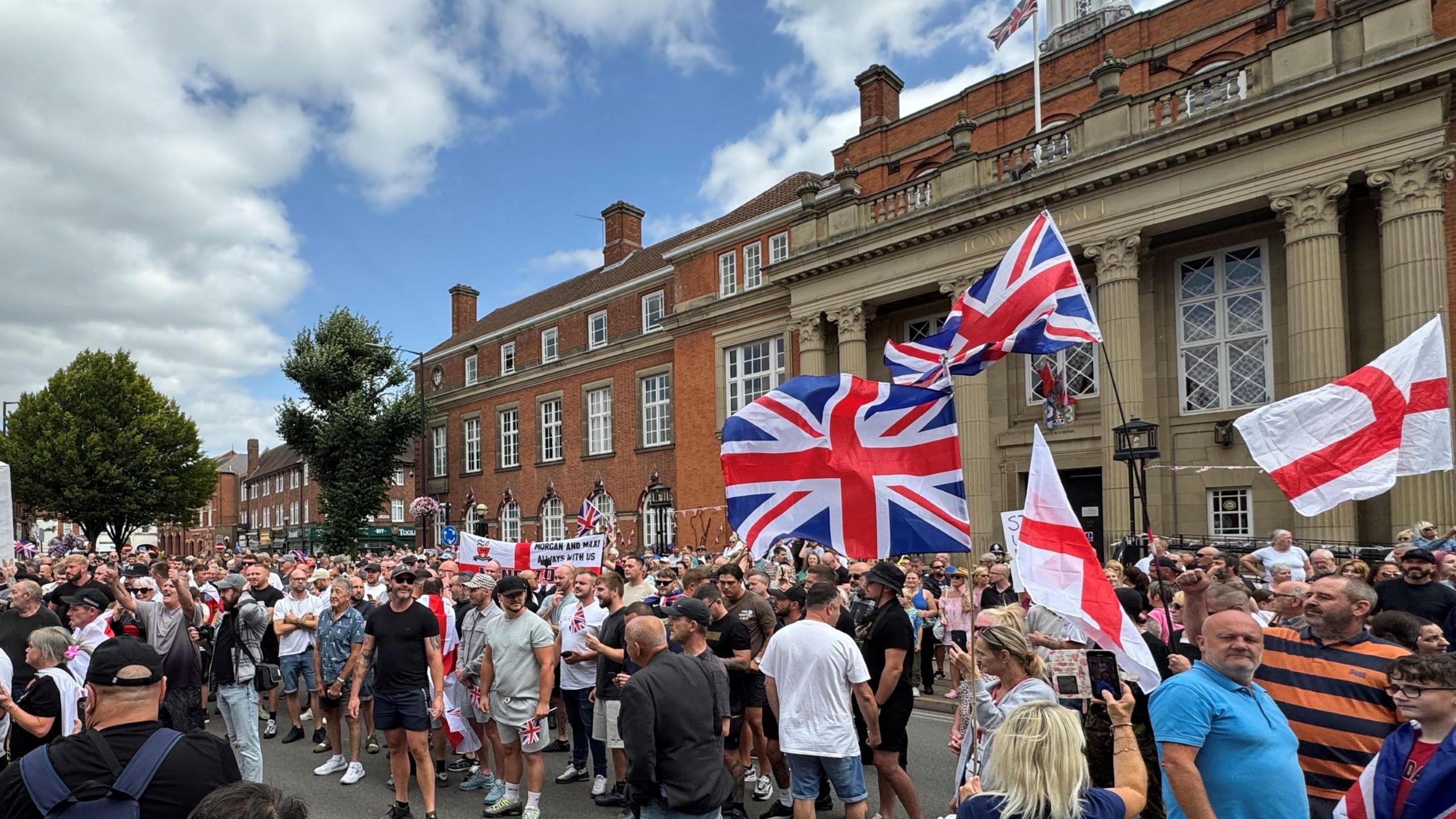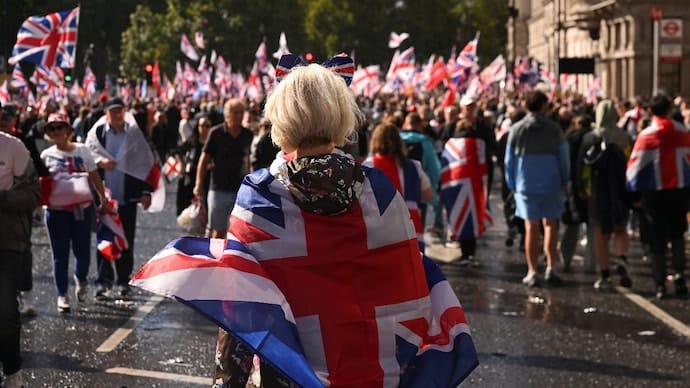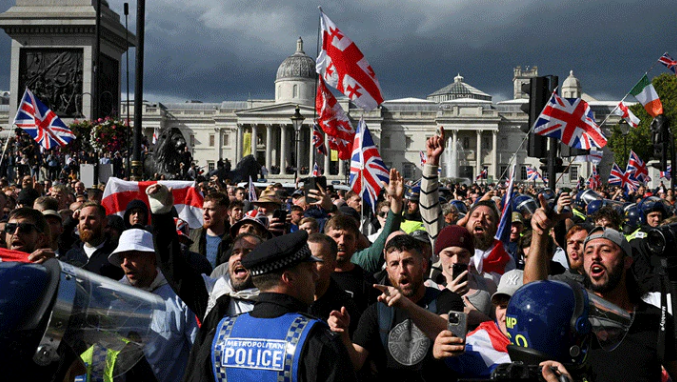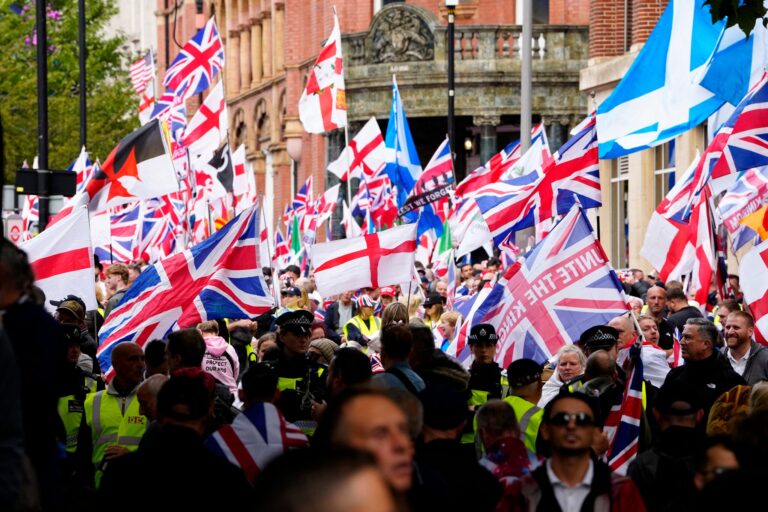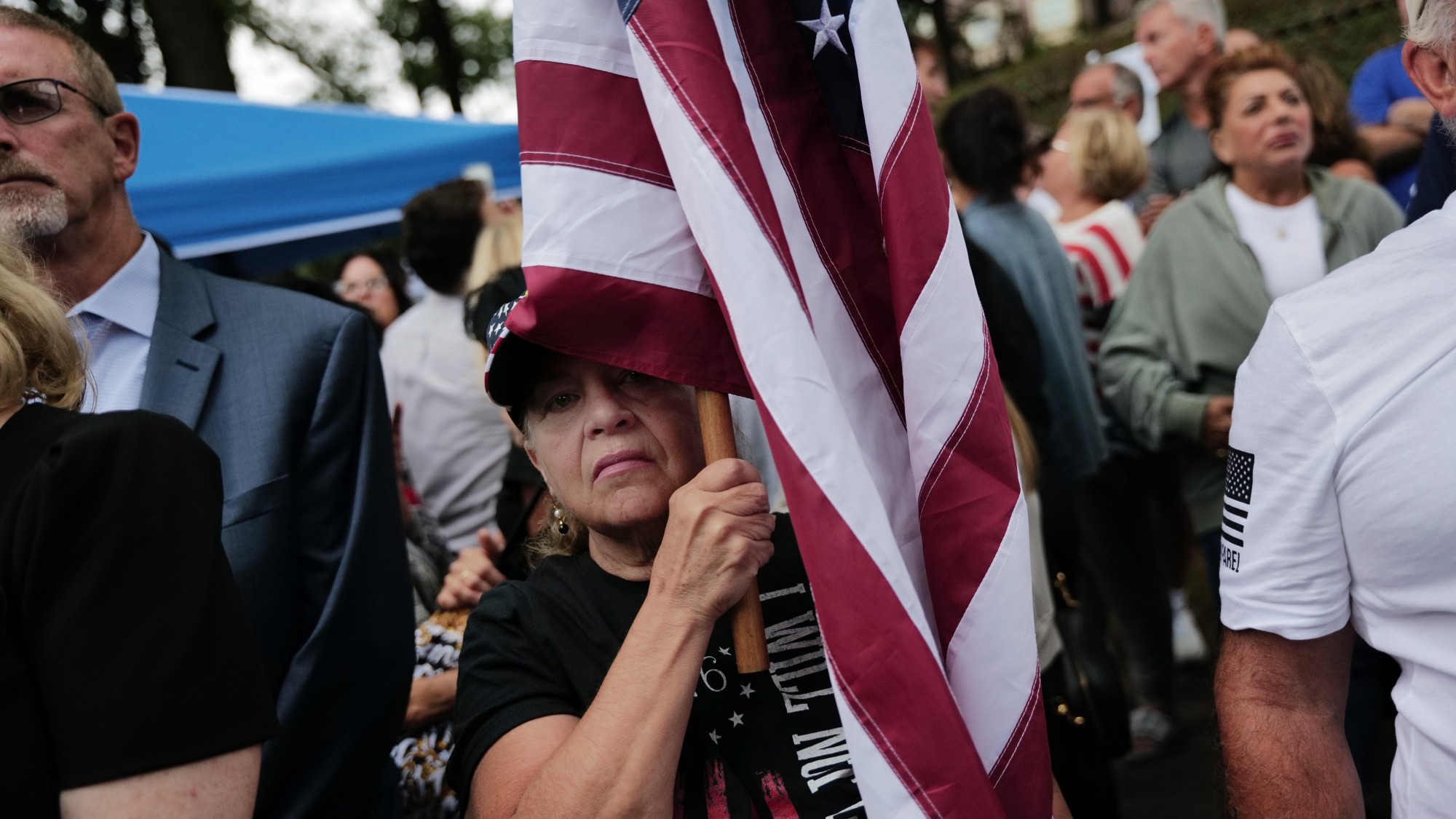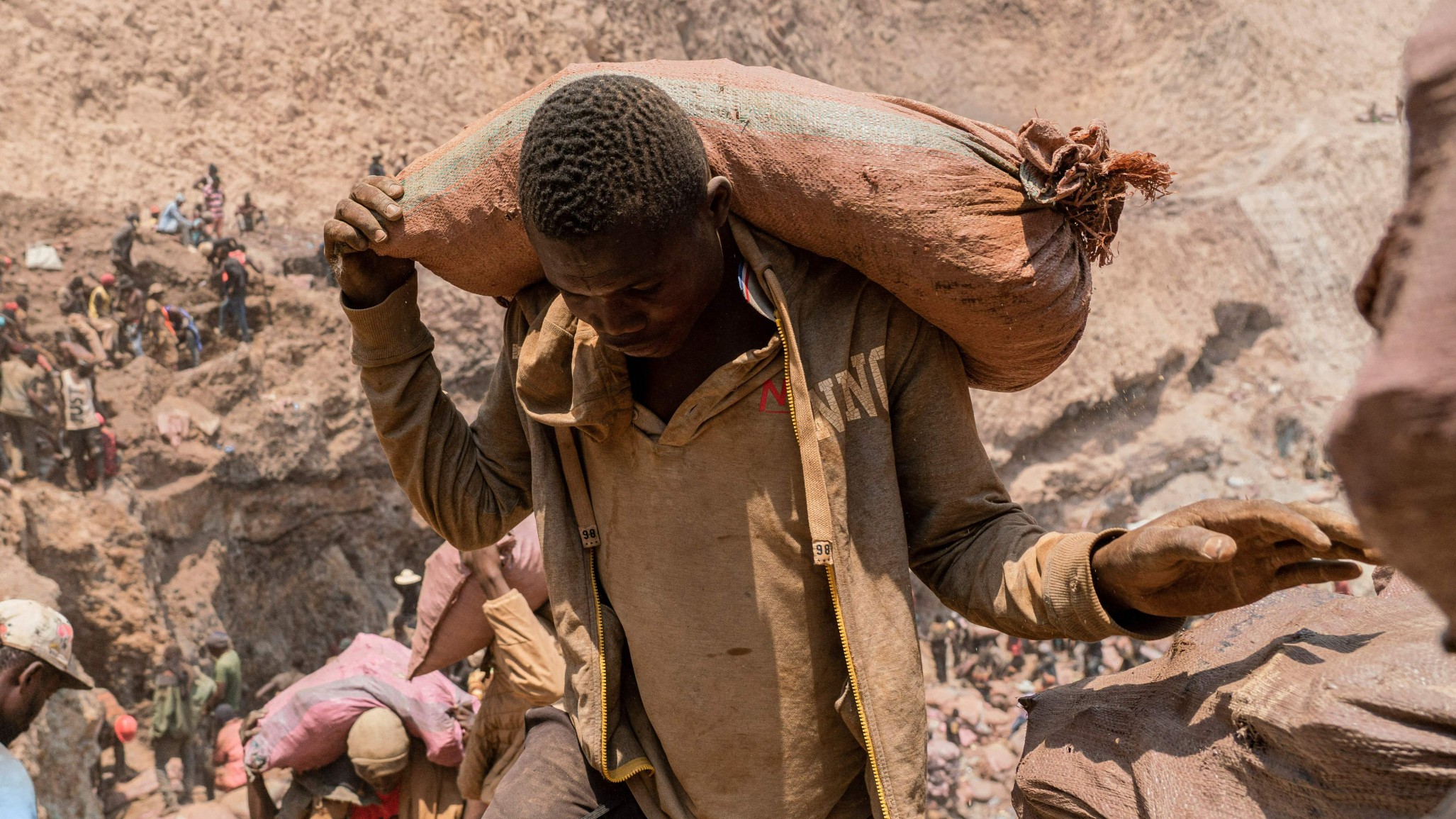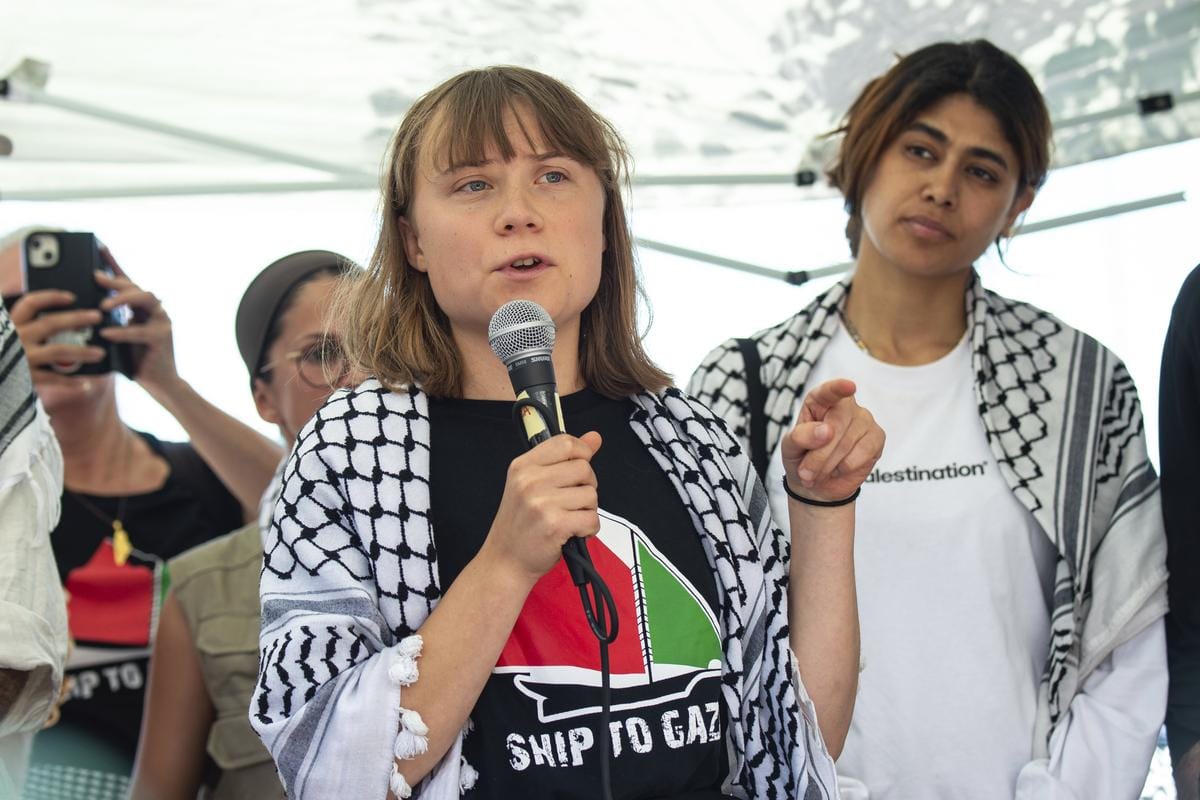In a post shared by a Twitter/X user that has now garnered over 9 million views, the caption reads: ‘They chased brown women at Tommy Robinson’s far-right rally. ‘I was born in this country.’ ‘Smack her, smack her.’‘ The video shows a white man aggressively chasing a brown immigrant woman, instigating violence against her.
Branded the “Unite the Kingdom” rally led by Tommy Robinson, a recent Anti-Immigrant protest in London drew more than a hundred thousand people to the streets, waving Union Jacks and chanting slogans like ‘Send them home‘ and ‘We want our country back.‘ Though, what is ironic is a video showing an anti-immigrant protester pausing mid-march to buy Indian food from the very same protest.
In the recent years, anti-immigrant rhetoric has moved from the margins into more visible, louder, and more organised spaces. It is not just Britain, there have been reports of riots in Europe, border crackdowns in the United States and protests in Australia, especially aimed at Indians. There is a particular language being repeated through slogans, chants, and media headlines which paint migrants as outsiders who “don’t belong.” This rhetoric creates a situation where hostility and violence is justified on the basis of cultural and economic protection.
By framing migrants as responsible for ‘stealing their jobs‘ and ‘making real-time demographic change‘, there is indeed a dangerous rhetoric being spread where xenophobia and racism gets reframed as patriotism and nationalism. What appears on the surface as concern for job security or cultural preservation is, in fact, a politics of exclusion that legitimises hostility towards communities of colour.
The weight of being a brown immigrant
Immigrants of colour, especially brown people, are routinely subjected to both online and in-person racism and xenophobia. Slurs, stereotyping, verbal abuse, and hate crimes form part of daily reality for brown people living abroad.
Dehumanising language are repeated over and over against brown people until it becomes internalised and normalised.
Thousands of posts circulating on multiple social media platforms promoting racism and xenophobia against brown people have garnered millions of likes, where they get stereotyped as being “smelly,” “dirty,” “hyper-violent,” and “predatory,” and having a “funny accent.” There is also a rise in racist slurs circulated widely under the guise of free speech or simply “just joking.” Dehumanising language are repeated over and over against brown people until it becomes internalised and normalised.
Then there are more severe violent or hate-crimes committed against brown immigrants abroad. To cite an instance, a Sikh woman was raped in Oldbury, near Birmingham in England. During that attack, she was told, ‘You don’t belong in this country, get out.‘ The cumulative effect of both “minor” harassment of slurs, stereotyping and “major” violence of hate-motivated assault, sexual violence, etc., have led brown immigrants to live in constant fear of being watched, judged and ultimately, in danger.
For brown immigrants, the label “foreigner” has greater implications and consequences.
Brown women at the frontline of hate
For brown women, amidst the anti-immigration protests, the two instances discussed above combined with similar episodes involving brown Muslim girls highlight how gender and race converge to make them especially vulnerable.
The viral video of a brown woman being chased at Tommy Robinson’s far-right rally, alongside the reported rape of a Sikh woman in Oldbury where she was told to ‘get out,‘ show how anti-immigrant hostility often translates directly into violence against women’s bodies.
Muslim girls in particular report being frequent targets in protest spaces. Their hijabs are pulled off, they get the word ‘terrorist‘ thrown at their faces, and are repeatedly told to ‘go back home.’
Instances like these are definitely layered with power politics where they’re performed in public spaces in broad daylight, as if to say or show ownership over who gets to belong where.
Despite being legal citizens, brown women are faced with the repeated reminder that documents do not shield them from xenophobia and racism.
Despite being legal citizens, brown women are faced with the repeated reminder that documents do not shield them from xenophobia and racism. Their bodies are made to be a site of conflict highly exposed as a foreigner, yet hidden beyond sight when it comes to equal treatment as citizens. This contradiction births constant fear wherein even ordinary acts like walking on a street or joining protests against racism lead to mockery, attacks, harassment or quite literally being chased down. This is how anti-immigrant rage and sexism intertwine to leave brown women vulnerable to both verbal and physical abuse.
The realities of being a queer immigrant
Queer immigrants, who come to supposedly “safe” countries like the United Kingdom to seek asylum report a range of abuses hurled at them. University of Birmingham reports that a trans woman, who had come to the UK as an asylum seeker, faced sexual harassment and was followed to her bedroom by men while others shared that they hid parts of their identity to stay safe. In another instance, a trans woman reported that she used to sleep with a knife under her pillow for safety.
These unsafe experiences inside asylum systems become even more dangerous when paired with the growing wave of violent anti-immigrant protests. The mix of neglect inside the asylum system and growing anger on the streets leaves queer asylum seekers facing danger from both sides. In the very places that are supposed to protect them, like housing centres, they often experience harassment, abuse, and isolation, and on the outside, anti-immigrant protests make them feel just as unsafe, with crowds openly calling for people like them to be sent away.
A community group which supports queer asylum seekers in the UK reports that queer people are now living in fear post the “Unite the Kingdom” rally in London. They are especially worried that the hateful slogans and anger at such protests could soon turn into direct attacks against them. They also added ‘We know from experience that far-right rhetoric can directly fuel harassment, discrimination, and violence — especially for people at the intersection of multiple vulnerabilities.‘
This ultimately leaves queer asylum seekers to live with a double risk of never fully secure indoors, and never truly welcome outdoors, forcing them to constantly navigate fear and uncertainty about where they can exist safely.
State and institutional complicity
State and institutional complicity plays a crucial role in reinforcing the hostility faced by immigrants, leaving even the legal citizens to bear the consequences of racism and xenophobia. In a way, one could also see how the US President Donald Trump led the change and normalised such discourse against immigrants with the Make America Great Again (MAGA) Movement, where nationalism and anti-immigrant rhetoric were two of the key features.
In Britain, rallies like “Unite the Kingdom” filled the streets with chants against immigrants, while in the United States, demonstrations like the “Unite the Right” rally openly celebrated white supremacist ideologies.
In Britain, rallies like “Unite the Kingdom” filled the streets with chants against immigrants, while in the United States, demonstrations like the “Unite the Right” rally openly celebrated white supremacist ideologies. France has witnessed violent anti-immigrant riots, and in Australia, protests have similarly taken place around exclusionary nationalist rhetoric.
These movements and protests filled with racism and xenophobia are often legitimised by the state and institutions. By normalising hostility and framing immigrants as threats, governments and movements alike create environments where prejudice becomes socially and politically acceptable. The result is a world where systemic discrimination is reinforced, human rights are undermined, and the very idea of belonging becomes increasingly debatable.
To counter this trend, states must move beyond exclusionary policies and foster inclusive frameworks that recognise migration as integral to social and cultural life, ensuring that citizenship and dignity are not reduced to the privileges of a select few.
About the author(s)
Mema is currently a Master's student at South Asian University (SAU). Hailing from Manipur, her lived experiences there have shaped a deep commitment to the feminist cause. She cares deeply about women and their future, which she tries to convey with her writing. She finds joy in reading, writing and cooking.
